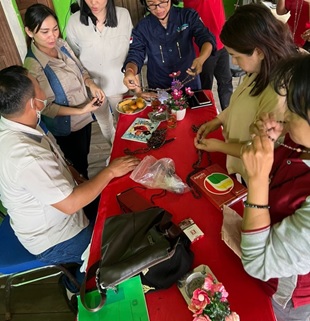Perumusan Rekomendasi Program Kerja Desa Digital di Desa Karuing, Kabupaten Katingan Formulation of the Recommendation on Digital Village Work Plan in Karuing Village, Katingan District
Main Article Content
Abstract
Digital village is the Indonesian government’s program to accelerate the development of a village and reduce the inequality in access to information between village and city. Advances in information technology have penetrated rural areas. It makes the implementation of digital village easier to implement. Karuing is a village in Katingan Regency, one of the villages that pointed to implementing a digital village in 2023. A meeting was held to inform the community about the implementation of Digital Village, followed by discussion and observation. The formulation of the work program was conducted at the end of 2022 through a focus group discussion with the village officials and the community. The results of the FGD were then analyzed using SWOT analysis, which became the basis of the formulation of the work program. The recommended work program covers the provision of ICT infrastructure in Karuing village, empowering the community to manage the ICT infrastructure and increasing the community’s digital literacy to maximize the implementation of the digital village. The main focus of the work program is the tourism attraction of Punggualas and the Eaglewood handicrafts that have high economic value.
Downloads
Article Details

This work is licensed under a Creative Commons Attribution-ShareAlike 4.0 International License.
Authors who publish with this journal agree to the following terms:
- Any article on the copyright is retained by the author(s).
- Author grant the journal, right of first publication with the work simultaneously licensed under a Creative Commons Attribution License that allows others to share work with acknowledgment of the work authors and initial publications in this journal.
- Authors are able to enter into a separate, additional contractual arrangements for non-exclusive distribution of published articles of work (eg, post-institutional repository) or publish it in a book, with acknowledgment of its initial publication in this journal.
- Authors are permitted and encouraged to post their work online (e.g., in institutional repositories or on their websites) prior to and during the submission process, as can lead to productive exchanges, as well as earlier and greater citation of published work.
- The article and any associated published material is distributed under the Creative Commons Attribution-ShareAlike 4.0 International License
References
Affandi, M., Bungai, J., & Perdana, I. (2020). Implementasi Literasi Digital Melalui Pengembangan Website Desa Sebagai Upaya Pemberdayaan Masyarakat. Jurnal AKRAB, 11(1), 54–63. https://doi.org/10.51495/jurnalakrab.v11i1.315
Ainiyah, R., Burhan, S., Ardiansyah, M. F., & Fidanti, D. P. (2021). Pengembangan Desa Digital Sebagai Upaya Mengangkat Potensi Lokal Desa Karangrejo. Jurnal Agro Dedikasi Masyarakat, 2(2), 13–18. https://doi.org/10.31764/jadm.v2i2.5999
Alvaro, R. & Octavia, E. (2019). Desa Digital: Potensi dan Tantangannya Peningkatan Kredit UMKM Melalui Rasio Intermediasi Makroprudensial Tantangan Revolusi Industri 4.0 di Sektor Pertanian. Buletin DPR, 4(8), 8–11.
Gurel, E., & Akkoç, U. (2017). SWOT analysis: A theoretical review. Journal of International Social Research, 10(51), 994-1006. http://dx.doi.org/10.17719/jisr.2017.1832
Nugroho, L. (2021). Konsep Pembangunan Dan Pengembangan Desa Digital. In: Pengantar Manajemen Potensi Desa: Aku Yakin desaku Punya Sejuta Potensi. Bojonegoro: Agrapana Media.
Simpson, J. E. (2020). Twenty-first century contact: the use of mobile communication devices and the internet by young people in care. Adoption and Fostering, 44(1), 6–19. https://doi.org/10.1177/0308575920906100
Suyatna, R. (2019). Desa Digital sebuah Konsep Katalisasi Pemberdayaan Masyarakat Desa. Jurnal Lingkar Widyaiswara, 6(1), 22–26.
UNESCO. (2003). The Prague Declaration: Towards an Information Literate Society. Prague: UNESCO
Wijaya, E., Anggraeni, R., & Bachri, R. (2013). Desa Digital: Peluang Untuk Mengoptimalkan Penyebarluasan Peraturan Perundang-Undangan Di Indonesia. Jurnal Dinamika Hukum, 13(1), 75–88.
Zaifuddin, Z. (2022). Pemberdayaan Masyarakat Melalui Online Marketing: Penguatan Ekonomi Masyarakat Desa Berbasis Digital. Jurnal Pemberdayaan Masyarakat, 10(1), 31. https://doi.org/10.37064/jpm.v10i1.10044
